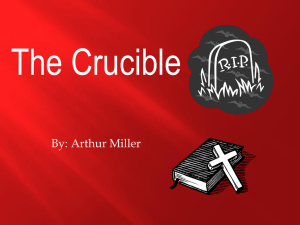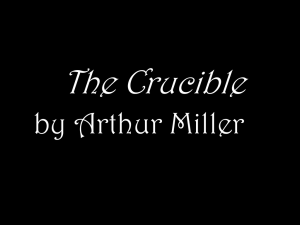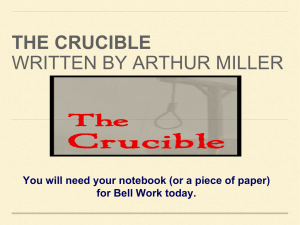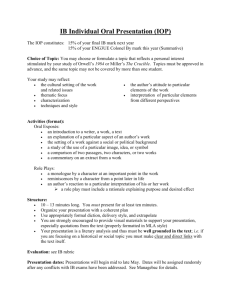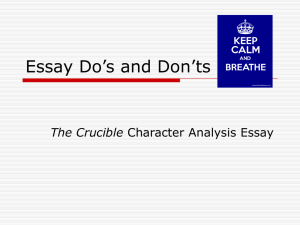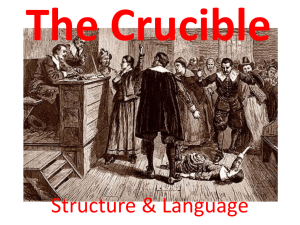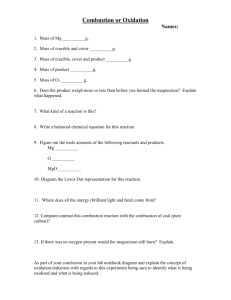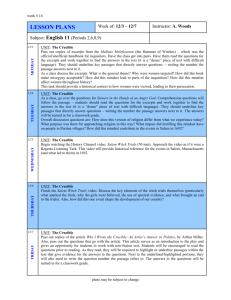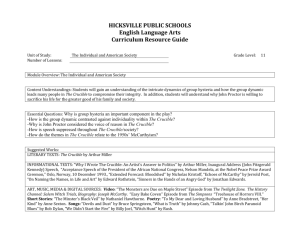The Crucible Post-viewing Questions the_crucible_post
advertisement
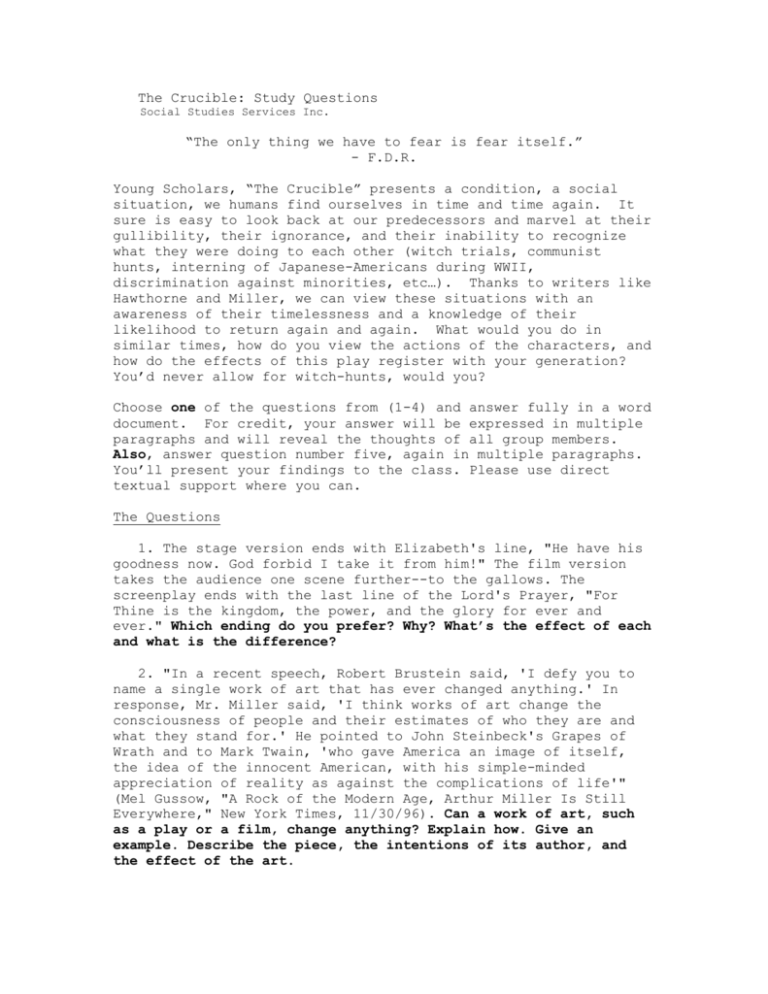
The Crucible: Study Questions Social Studies Services Inc. “The only thing we have to fear is fear itself.” - F.D.R. Young Scholars, “The Crucible” presents a condition, a social situation, we humans find ourselves in time and time again. It sure is easy to look back at our predecessors and marvel at their gullibility, their ignorance, and their inability to recognize what they were doing to each other (witch trials, communist hunts, interning of Japanese-Americans during WWII, discrimination against minorities, etc…). Thanks to writers like Hawthorne and Miller, we can view these situations with an awareness of their timelessness and a knowledge of their likelihood to return again and again. What would you do in similar times, how do you view the actions of the characters, and how do the effects of this play register with your generation? You’d never allow for witch-hunts, would you? Choose one of the questions from (1-4) and answer fully in a word document. For credit, your answer will be expressed in multiple paragraphs and will reveal the thoughts of all group members. Also, answer question number five, again in multiple paragraphs. You’ll present your findings to the class. Please use direct textual support where you can. The Questions 1. The stage version ends with Elizabeth's line, "He have his goodness now. God forbid I take it from him!" The film version takes the audience one scene further--to the gallows. The screenplay ends with the last line of the Lord's Prayer, "For Thine is the kingdom, the power, and the glory for ever and ever." Which ending do you prefer? Why? What’s the effect of each and what is the difference? 2. "In a recent speech, Robert Brustein said, 'I defy you to name a single work of art that has ever changed anything.' In response, Mr. Miller said, 'I think works of art change the consciousness of people and their estimates of who they are and what they stand for.' He pointed to John Steinbeck's Grapes of Wrath and to Mark Twain, 'who gave America an image of itself, the idea of the innocent American, with his simple-minded appreciation of reality as against the complications of life'" (Mel Gussow, "A Rock of the Modern Age, Arthur Miller Is Still Everywhere," New York Times, 11/30/96). Can a work of art, such as a play or a film, change anything? Explain how. Give an example. Describe the piece, the intentions of its author, and the effect of the art. 3. In drama, a "foil" is a character written to contrast with another. Comparing two foils will often clarify the motives of both. Contrast the characters of John Proctor and the Reverend John Hale. What are their motives and how do they differ? What other pairs of characters in The Crucible might be seen as foils? Explain. 4. Do you think John Proctor made the right decision in choosing to die rather than to sign a false confession? Is it ever permissible to lie to save your life? Isn't a survivor a hero, too? What if you have a child? Does a parent have an obligation to stay alive in order to take care of his or her children? If so, how can you reconcile this belief with John Proctor’s actions? Every group must do the question on the back 5. Which of the following opinions about The Crucible do you most agree with? Least agree with? Why? Explain in several paragraphs. 1. "The way The Crucible speaks to us today has less to do with any specific instance of collective indictment than it does with the relentless group-think mentality of modern America, where people, crushed under by a bureaucratic/consumerist/media culture, rely more and more on forces outside themselves to determine what to like, what to say, what to believe" (Owen Gleiberman, "Bewitching Hour," Entertainment Weekly, 11/29/96). 2. The Crucible "still speaks to weaknesses of the human character, but stretch as you will, there is simply nothing in today's society to match the paranoia that Sen. Joseph McCarthy and others exploited. So we're left with a story about a community of people so ignorant and superstitious, you'd probably look up the village idiot for advice" (Jack Mathews, "It's a Different Era for Miller's Salem," www.newsday.com 1996). 3. “Though ignorant tyranny is taken to task either way, the true issue here is repressed sexuality, not political prejudice" (Michael Atkinson, "A Chilling Tale of Sexual Dread and Christian Mob-Panic," www.mrshowbiz.com 11/27/96). 4. "One of the most contemporarily relevant aspects of The Crucible, the ease with which justice can be manipulated and perverted, is what Hytner and Miller have chosen to highlight in this adaptation" (James Berardinelli, "The Crucible (1996)," www.cybernex.net 1996). 6. "...this Crucible is a reminder of the play's wide reach, which goes well beyond witch trials in any century. As adapted gamely by the playwright into a screenplay that takes advantage of scenic backgrounds and photogenic stars, The Crucible now speaks to subtler forms of dishonesty and opportunism than it did before. This agile film is so simply, abstractly rooted in Salem's soil that it becomes free to suggest anything from the impact of religious fundamentalism on politics to the hysterical excess of tabloid television. Along the way, this Crucible heats up its dramatic tale of marital betrayal and redemption without losing track of its central concern, the murderous power of lies" (Janet Maslin, "The Bewitching Power of Lies," New York Times, 11/27/96). 8. "Later, as we prepared to shoot the movie, we were struck time and again by its alarming topicality: it spoke directly about the bigotry of religious fundamentalists across the globe, about communities torn apart by accusations of child abuse, about the rigid intellectual orthodoxies of college campuses--there is no shortage of contemporary Salems ready to cry witchcraft" (Nicholas Hytner, "Filming The Crucible," The Crucible: Screenplay, Penguin Books, ©1996). 9. "And so the final irony may well be that the movie it was thought impossible to make during the McCarthy years because it was about McCarthyism...turns out not to have been about that particular social deformation at all. Rather, it was about something more universal--fear of forces one can't understand and control" (Victor Navasky, "The Demons of Salem, With Us Still," New York Times, 9/8/96).
